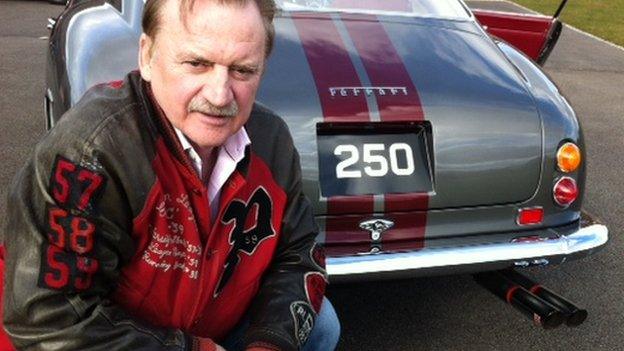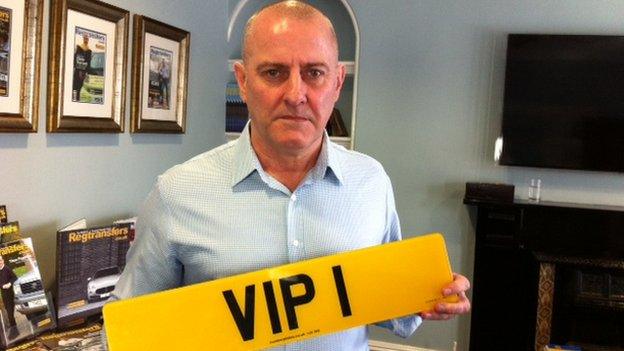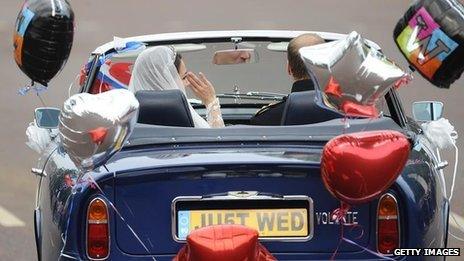'My number plate could have cost £1m'
- Published
The BBC's Kevin Peachey reports on the market for personalised number plates
When the auctioneer's hammer came down, classic car dealer John Collins was looking at a bill of £518,000.
But it was not a rare Ferrari that he had bought. It was a number plate.
The registration plate "25 O" is the most expensive ever bought at a Driver and Vehicle Licensing Agency (DVLA) auction.
Even so, Mr Collins, who owns classic Ferrari dealer Talacrest, says he would have bid more at the auction for the plate which matches the 250 model.
"It was a question of holding one's nerve until the very end," he says, glancing at the plate on the vehicle which itself has an estimated value of millions of pounds.
"I'm glad it stopped where it stopped - £520,000. You could buy a couple of nice cars with that.
"I hate to say it but it could have been the first £1m number plate. I'm glad it wasn't, but I hope one day it will be."
He is not the only motor enthusiast buying a personalised plate as an investment, according to brokers. Despite sometimes being seen as a tacky accessory for the rich and famous, the popularity and value of some plates have been rising.

Most expensive number plates at DVLA auctions
"25 O" - £518,000 in November 2014
"1 D" - £352,000 in March 2009
"51 NGH" - £254,000 in April 2006
"1 RH" - £247,000 in November 2008
"K1 NGS" - £231,000 in December 1993

Choices

John Collins and his record-breaking number plate
Mr Collins bought his record-breaking number plate at a DVLA auction. The Agency hosts five physical auctions and four online auctions each year, but there are also 30 million registrations available to buy on its website, external.
Prices start from £250. Some 4.2 million have been sold since the DVLA began selling them in 1989, with more than £2bn raised for the Treasury in that time.
Jody Davies, auction manager at DVLA Personalised Registrations, says that the typical price for those that go under the hammer at auction is about £2,000.
Their popularity, she says has "never really waned" but the reasons for purchases are many and varied, as are the prices paid.
Some drivers buy them as a gift for a loved one, others use them to promote their business, and some are keen to cover up the age of their vehicle with a personalised plate.
But they are unlikely to get their hands on a rude registration. The DVLA has a steering group that assesses potential plates for propriety. That assessment may change as new collections of letters can take on new meanings, such as in text message language.
New numbers

John Doherty works for a broker that buys and sells sought-after number plates
There are, of course, new editions to regular registration plates released twice a year. The new series, carrying the number "15" to designate the year, have been on the roads since the start of March.
When the DVLA issues these plates, it holds some back that could be considered as personalised and sold. None of the personalised plates it sells have been on any vehicle before.
It does not trade in existing plates. That is done in a parallel market, primarily by brokers such as Regtransfers, based in Bedfordshire.
Stock purchase manager John Doherty says that buyers - certainly among their celebrity clients - are most likely to search for their initials, but they can come in at a high price.
The cost falls by adding in extra letters, and numbers, and hoping that such a combination is available.
Ultimately, he argues, it is an investment that allows motorists some enjoyment along the way.
"It is something they can use every single day of the week, and it does not depreciate in value, unlike a car," he says.
"Hopefully when it comes to selling it, you should get a good return."

Some personalised plates are used on special occasions, such as Royal weddings
The cost of getting a personalised number plate does not necessarily end at an auction or with a broker.
There is the cost of getting the number plate made up. Drivers doing so will probably have to take a certificate of entitlement - a V750 - to prove that the number can be used.
This certificate needs to be renewed for a charge of £25 but, from Monday, this only needs to be done every 10 years.
There may also be a charge to assign the registration number to the vehicle of their choice. All the rules are outlined on the government's website, external.
Insurers should also be informed of any change of registration. Matt Oliver, of price comparison website GoCompare, says that a personalised number plate should not add to the cost of a premium.
However, should something happen to the vehicle, there could be implications for the number plate.
Mr Oliver suggests that owners get a letter of non-interest from an insurer in order to keep the entitlement to the number if the vehicle is scrapped. If it is stolen, then an owner should tell their insurer they want to keep their entitlement as soon as possible.